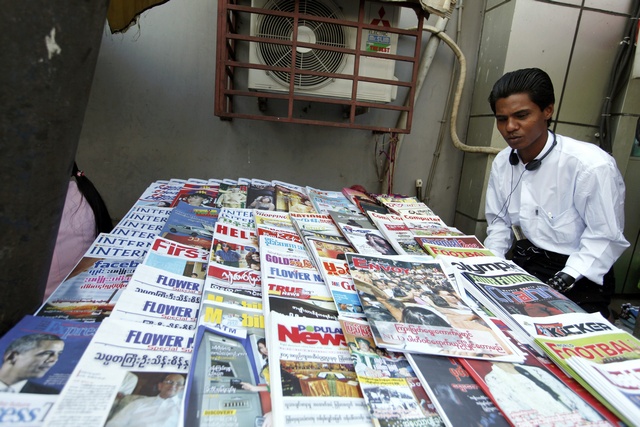Five media workers are still being held inside Burma’s notorious Pakokku and Insein prisons for reporting on an alleged chemical weapons facility in Magwe Division’s Pauk Township.
Lu Maw Naing, reporter for Unity Weekly was arrested in Pauk on Friday following a 25 January report detailing the facility’s location. The publication’s Chief Executive Officer Tint San and three other reporters, Paing Thet Kyaw, Yazar Oo and Sithu Soe were arrested 1 February in their Rangoon offices without police warrants, according to the paper’s staff.
Lu Maw Naing has been charged under article 3(1)A of the Official Secrets Act, which criminally implicates any citizen who “approaches, inspects, passes over or is in the vicinity of, or enters, any prohibited place” for any purpose “prejudicial to the safety or interests of the state”. The colonial era law carries a maximum sentence of fourteen years prison for cases involving military installations.
Law Maw Niang’s home was searched on Sunday, according to family members who were told by the police Special Intelligence Unit not to visit the reporter in custody in Pakokku prison.
[related]
However Unity Weekly’s Rangoon office coordinator Aung Win Tun said the families of the Tint San and the three Rangoon staff were informed on Monday evening that they could visit them inside Insein prison from then on.
Meanwhile, police across the country seized circulating copies of the 25 January edition, which claimed the facility covered more than 3,000 acres of land and had been visited by former Junta leader Than Shwe as well as current Tatmadaw chief Min Aung Hlaing.
“They came to my shop with a search warrant and seized the remaining copies of the journal, they also ask for my personal details,” said Tut, a newspaper salesman in Gyobingauk, Pegu Divison.
The incident indicates a divergence from President Thein Sein’s public stance on press freedom.
Shawn Crispin, senior South East Asia representative of the Committee to Protect Journalists noted “the fact that journalists can be charged with revealing state secrets shows how desperately Burma needs meaningful legal reform.“
“Weapons proliferation issues are central to Burma’s political narrative and journalists should not be threatened or arrested for reporting on topics of national and international importance”, said Crispin.



